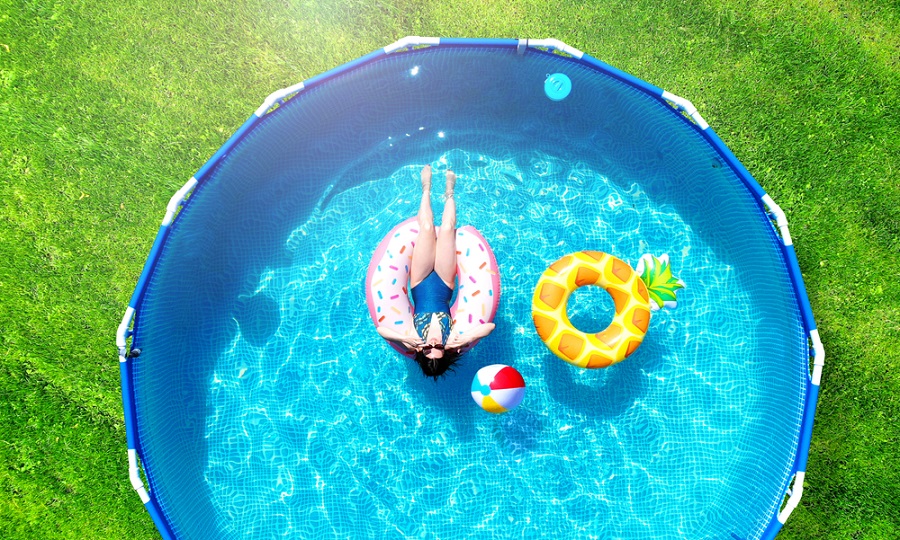Buying an above-ground pool is a big decision, and it can be overwhelming to know where to start. We’ve put together this guide to help you make the right choice for your backyard!
What Is The Best Type Of Pool For Your Home?
There are many different types of pools available on the market today. These include:
Above-ground pools – these have been around since the 1950s and are still very popular with homeowners. They come in various shapes and sizes and are usually constructed using a thick vinyl or rubber container supported by a structure made of steel, wood, concrete, or fiberglass.
In-ground pools – built inside a pit that is dug into the earth. They are usually built by contractors who specialize in them. Usually made of fiberglass or gunite/cement.
Spa/jacuzzi pools – are designed to mimic the feeling of being in a spa. This type of pool is smaller and shallower than the other two and typically used for relaxation and just a quick cooling down.
Semi-Buried vs. Traditional Above-Ground Pools
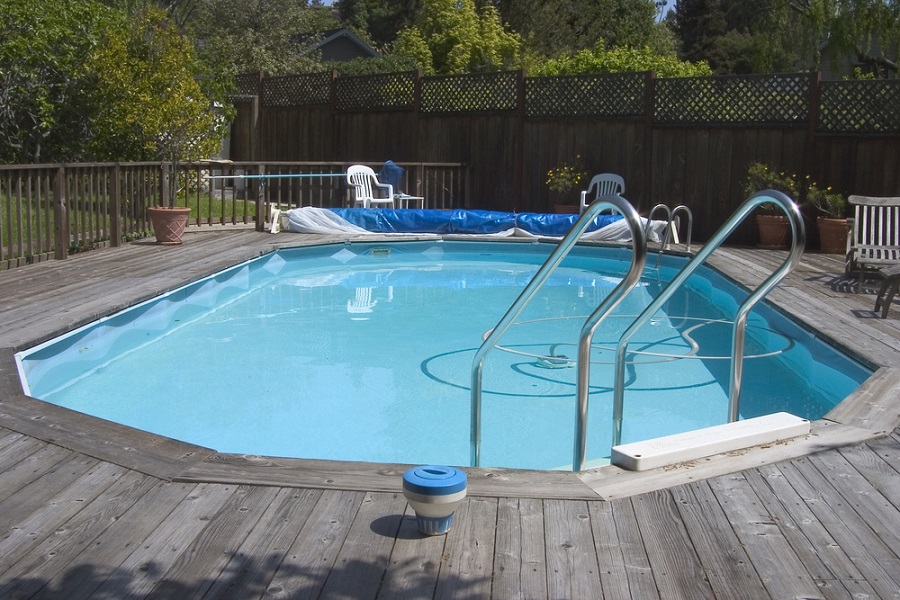
There are two ways to install an above-ground pool: semi-buried and fully above-ground.
Semi-buried means that the pool sits partially below grade, while fully above-ground means the entire pool sits above (or technically, on top of) the ground.
Semi-buried pools are commonly found in yards that have a natural slope to them. However, they require more space than fully above-ground pools. In addition, they are more expensive and more complicated to install due to the half-in, half-out nature of the containing structure.
Fully above-ground pools are less expensive to install but are a bit more prone to leaks.
How to Plan for Your New Above-Ground Pool
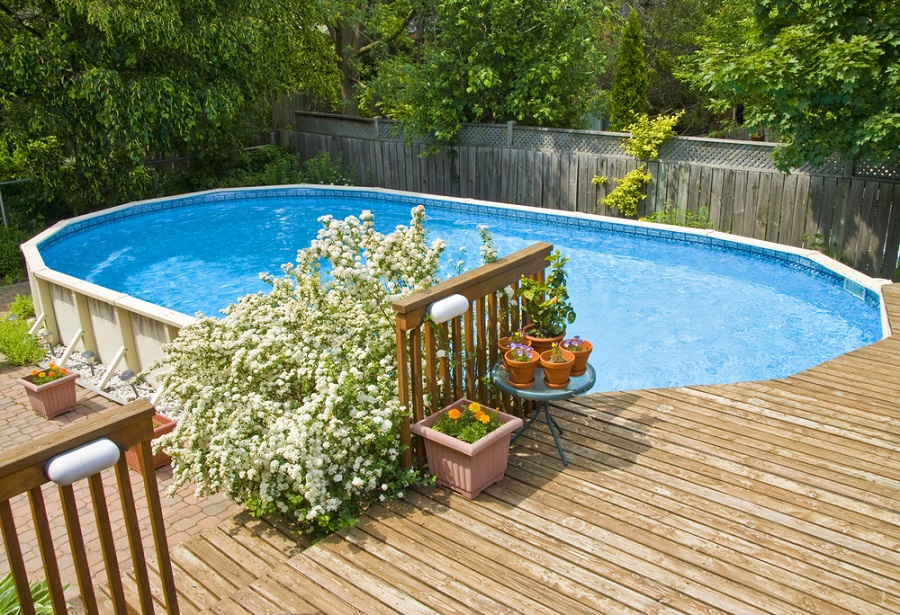
Now that you know what kind of pool you’re looking for, you’ll need to consider other factors such as location, size, maintenance, and budget.
Location: Location plays a significant role in determining the type of pool you should buy. If you live near a lake or river with a high water table, an above-ground pool is ideal. On the other hand, if you live in a dry region, then a traditional in-ground pool may be the way to go.
Size: The size of your new pool determines not just the initial cost to install, but the long-term cost of operating and maintaining your pool, so you need to make sure you don’t oversize it.
For example, you’ll probably want a bigger pool if you have kids. But, if you only plan to use it occasionally, you may want to consider a smaller pool suitable for 3-4 people.
Maintenance: Maintenance is another factor you’ll need to think about when buying a pool. A regular maintenance schedule will keep your pool running smoothly and prevent expensive repairs down the road. Powering a pool pump can easily add $50 to your monthly power bill, as well.
Budget: Finally, you’ll need to determine how much money you can afford to spend on your new pool. Smaller above-ground pools typically cost $3,000 to $5,000 to purchase and install. The largest semi-buried pools run between $10,000 and $40,000.
Once you’ve determined all these things, you can narrow down your options by comparing prices, features, and reviews.
Features of Above-Ground Pools
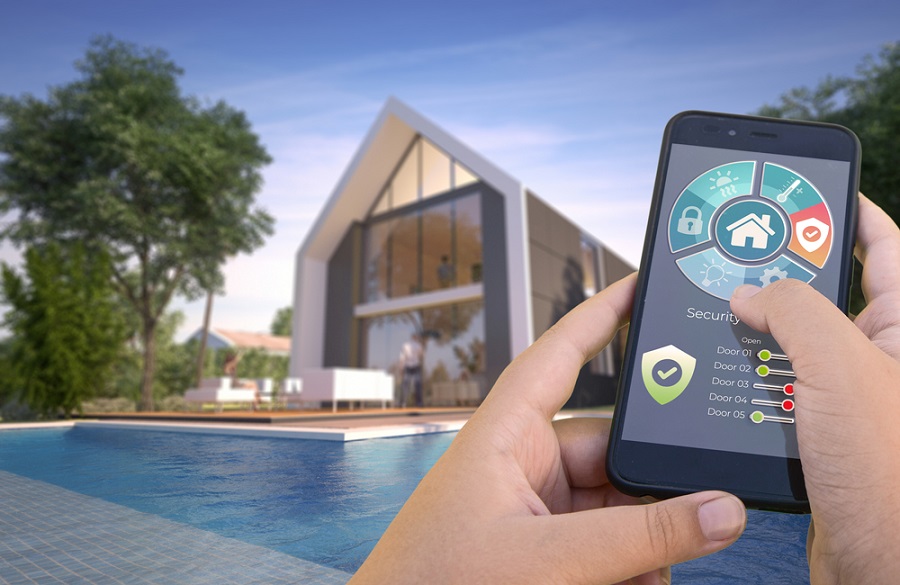
Safety Features
The first thing you’ll want to consider is whether your new pool has any safety features. Safety features include alarms, automatic covers, and even fire suppression systems.
Alarms: Water disturbance alarms are helpful because they let you know when someone enters or exits your pool without your permission. This helps you avoid accidents like drowning.
Automatic Covers: Automatic covers are useful because they automatically close over the pool when you leave. It prevents anyone from falling into the water and becoming trapped inside.
Fencing: if you have children and/or pets, you will likely need to add childproof fencing with door locks to keep your pool safe when not supervising it. In most cities, local regulations dictate the minimum fence requirements.
Ladders: every above-ground pool will come with a ladder to help with egress/ingress. That said if you expect small children or persons with disabilities to use your pool, take care to purchase the right kind of ladder for their safety and convenience.
Design Features
Next, you’ll want to look at your new pool’s design. Design features include decking, lighting, and steps.
Decking: Decking provides a safe surface around your pool. It also gives you somewhere to sit during hot summer days.
Lighting: Lighting makes your pool more attractive and comfortable. It also ensures that no one gets hurt if they fall into the water.
Steps: Steps are a good alternative to a ladder because they allow you to enter and exit your pool more easily.
If you have young children or older adults visiting, you may want to consider installing steps instead of or in addition to a ladder. That said, some above-ground pools are really not large enough to allow space for proper steps.
Filter & Pump Options
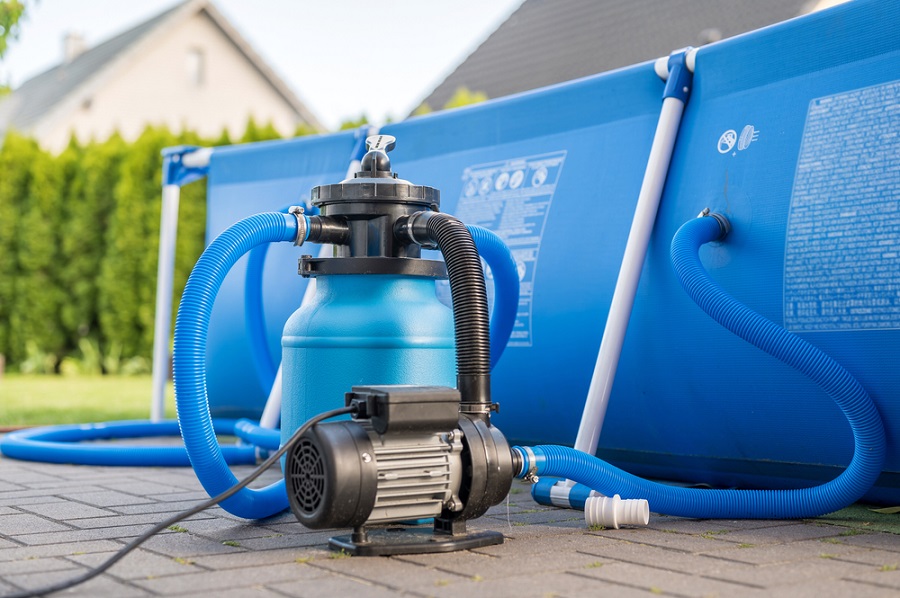
Finally, you’ll want to think about how convenient your new pool will be for you. Convenience features include ladders, drains, and pumps.
Pool Filters: Pool filters are used to clean debris, sand, and biologicals from your swimming pool water on a regular/daily basis automatically. There are three types to choose from: sand filters, traditional paper/media filters, and osmosis filters. The vast majority of above-ground pools will use sand or traditional filters.
Drains: Every above-ground pool should have at least one drain with a valve or drain pipe installed at the very lowest point of the floor bottom. Many also include a drain in each automatic pool skimmer. All drains should feed dirty pool water directly into the pool filter before sending them to heaters or cooling units.
Pool Pumps: Pool pumps circulate the water from the pool drains and skimmers into the pool filter before pushing them through heaters or cooling units, then back into your pool via return lines.
Above Ground Pool Installation
Once you’ve decided what kind of pool you’d like, you’ll need to find a reputable installer.
The best way to do this is by calling local contractors. Ask friends and neighbors for recommendations. Also, ask your state’s Department of Health for a list of licensed installers.
Once you’ve found a contractor who meets your standards, please schedule an appointment to meet them. During this meeting, the installer should show you samples of his work so you can see firsthand what he does. He should also explain all of the details of the installation process.
After choosing an installer, you’ll need to sign a contract with him. In the contract, you’ll specify everything from the size of the pool to the type of materials used. You’ll also need to give him a down payment.
After you’ve signed the contract, the installer should begin working on your project. He’ll start by clearing out your yard and preparing the site. Next, he’ll dig the hole for your pool. Once the hole has been dug, he’ll pour concrete.
When the concrete has been set up, he’ll add a liner to the bottom of the pool. Finally, he’ll cover the pool with sand.
If you’re having trouble finding a good installer, check online. There are many websites where you can post ads looking for someone to build you a pool.
Pool Maintenance
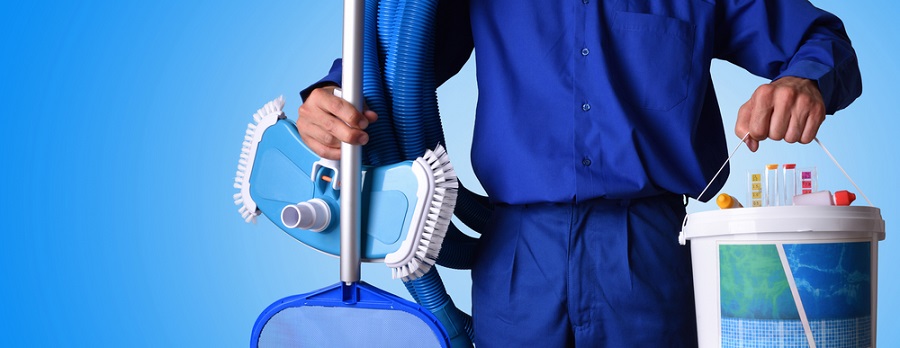
Now that your pool has been installed, you’ll need to clean and maintain it properly.
First, make sure that you keep your pool clean. Cleaning your pool regularly helps prevent algae growth. Algae can turn your pool green and ruin its appearance.
For larger above ground pools, we recommend purchasing an automatic pool cleaner. There are three kinds to choose from:
- suction-side pool cleaners: most involve attaching a long hose to your pool skimmer and the other end to a vacuum head - then, you manually vacuum silt from the bottom of the pool. Cheap and effective, but not automatic.
- pressure-side pool cleaners: these automatic pool cleaners use water pressure from your return line to drive an automatic vacuum across the bottom of your pool, cleaning debris as it goes. The most popular brand is Polaris.
- robotic pool cleaners: these are the most expensive, but cost the least in terms of energy use and are the most thorough cleaners out there. Most above ground pools don't require an expensive robot pool cleaner, so don't overpay for one.
You’ll also need to treat your pool regularly with chemicals. These chemicals help kill bacteria and other organisms that could harm your pool. They also help control algae growth.
You should use chlorine-based chemicals to disinfect your pool. Chlorine kills germs and prevents the spread of disease. However, too much chlorine can bleach your skin and hair. Therefore, you should only use enough chlorine to sanitize your pool to avoid these problems.
If you use a salt water chlorinator, then you will need to add salt to your pool water each month to keep it topped up.
When using chlorine-based chemicals, follow the manufacturer’s instructions carefully. Doing so ensures that you get the right amount of chlorine for your pool and you avoid causing chemical burns.
Finally, you’ll need to drain and refill your pool at least once a year. This allows you to clean it thoroughly. It also lets you know if there are any problems with your pool. If you notice anything wrong, call a professional immediately.
FAQs
Q: What is the difference between above-ground and in-ground pools?
A: An above-ground pool sits on top of the ground. This means that it normally doesn’t have a foundation. Instead, it rests directly on the soil. Because of this, an above-ground pool is significantly less expensive to install than an in-ground pool.
Above-ground pools are generally easier to install because they don’t require digging holes. However, installation requires the construction of a holding container, decking, fencing and other components that can be tricky to install on your own.
On the other hand, in-ground pools sit in a hole that’s as deep as you pool will be. The walls of the pool are often made of cement or gunite and are reinforced with rebar. This makes them stronger than above-ground pools.
Because of their inherent strength and support from surrounding earth, in-ground pools tend to last longer than above-ground pools. That said, they tend to be larger and require more maintenance and energy to run.
Q: How long will my pool last?
A: A pool can last from 10 years to 20 years or more. Of course, the quality of the materials used affects how long your pool lasts.
The best way to find out how long your pool will last is to look at the warranty information. Most manufacturers provide warranties ranging from five to 15 years.
Q: Do I need a permit to install an above-ground pool?
A: Yes. In most states, you must obtain a building permit before installing an above-ground pool. You can learn more about obtaining permits by visiting your local city hall or county clerk’s office.
Q: Is it safe to swim in an above-ground pool? Will it hurt me?
A: Swimming in an above-ground pool is just as safe as swimming in an in-ground pool or hot tub. There are some things to consider, though. For instance, you might want to wear sunscreen when you go into the sun. Also, you shouldn’t dive into the pool without first checking the depth.

